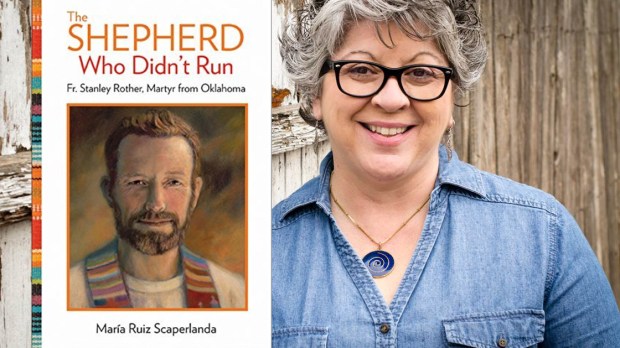Lenten Campaign 2025
This content is free of charge, as are all our articles.
Support us with a donation that is tax-deductible and enable us to continue to reach millions of readers.
Aleteia posed six questions to Maria Ruiz Scaperlanda about her latest book, The Shepherd Who Didn’t Run: Fr. Stanley Rother, Martyr from Oklahoma, published by Our Sunday Visitor Books. A date for Fr. Rother’s beatification, which will take place in Oklahoma City, will be announced soon.
1) What inspired the book?
This is the first published biography of Father Stanley Rother, an Oklahoma priest who served for 13 years at Oklahoma’s mission in Santiago Atitlán, Guatemala until he was murdered in his rectory at the parish church of Santiago Apóstol.
Last December, Pope Francis declared Father Stanley a martyr of the Church, paving the way for his beatification later this year. Once he becomes Blessed Stanley Francis Rother he will be included in the Roman martyrology – the official list of saints and blessed of our Church. He is the first martyr born in the United States, as well as the first priest and the first male born in the United States to be approved for beatification!
It is important to note that Father Stanley was one of literally hundreds of thousands who were persecuted for the faith, kidnapped, murdered, or simply desaparecidos (“disappeared”) during Guatemala’s long and brutal civil war. So this declaration of martyrdom is especially significant to the Church in Guatemala, which suffered for so long.
2) If you could give this book another title, what would it be?
The title of this book is actually perfect – and I didn’t even pick it! It comes from Father Stanley’s final Christmas letter to Oklahoma Catholics, published in two diocesan newspapers in December of 1980:
“The shepherd cannot run at the first sign of danger. Pray for us that we may be a sign of the love of Christ for our people, that our presence among them will fortify them to endure these sufferings in preparation for the coming of the Kingdom.”
Stanley Rother was genuinely the shepherd who didn’t run, remaining faithful to his priestly ministry, and to his persecuted and suffering parishioners.
3) What story or anecdote (or piece of advice) in this book most personally resonated with you?
One of the things that surprised me as I learned about Stanley Rother’s life was his struggle with learning Latin during his years in the seminary. It was such a huge issue that he eventually failed his first year of Theology and was sent back home from the seminary! Thanks to a supportive bishop, Stanley went on to complete his studies at a different seminary. His resolve and unwavering commitment to becoming a priest is truly admirable.
But what makes this piece of his story even more remarkable is the fact that, once in Guatemala, he was able to become quite adequate in speaking Spanish—but also completely fluent in Tz’utujil, a rare and challenging Mayan dialect. Not only was this impressive, but it was this ability to communicate with his beloved parishioners in their native language that allowed him to be fully embraced and claimed as one of their own by his parish community. Padre Apla’s, his name in Tz’utujil, loved and cherished sharing with his community in all aspects of their life – sacramental, liturgical, cultural, and above all family life.
4) Did writing this book teach you anything?
In my experience, writing projects always offer many lessons, and this one has been a special project in so many ways!
Father Stanley’s personal story, for example, is a reminder that God does not waste any details! Much of what made Father Stanley relatable to the Tz’utujil in Guatemala– being a farmer, devoted to his family, in tune to nature, relatable to children, able to fix anything — came from his upbringing in a staunchly religious, practical, large, German Catholic family in the small rural settlement of Okarche, Oklahoma. That seems to me clearly a God-thing!
As I’ve noted before in other interviews, the reality is that we are all called to be holy men and women living our daily, quotidian lives focused on the presence of God who is in the here and now. I believe that Father Stanley’s story is a perfect reminder for all of us of this call, this summon, no matter who we are or where we live.
Our Catholic faith and tradition is rich in beautiful stories of faith – and yes, many martyrs. And these holy men and women come from insignificant places like Gulu, Uganda, and Okarche, Oklahoma.
5) If there is one person you want to reach with this book, who would it be?
Stanley Francis Rother was not a celebrity or a president of anything. He was not an all-star or even the best at any particular thing. He was ordinary, like you and like me. That makes his story so very uplifting and inspiring. He was a good man who chose God first, over and over, in little things and ordinary things, throughout his life. And when the time came for what became his final decision — to remain with and be present to his persecuted flock — Father Stanley’s resolution and certitude flowed naturally out of those previous decisions.
This book is for anyone and everyone who wonders, perhaps with a healthy amount of skepticism, whether one person or one life can make a difference.
6) What is the ideal beverage to have in hand while reading your book?
I suggest a good, strong coffee!
This is the first of Aleteia‘s weekly author interview series about books worth reading.

